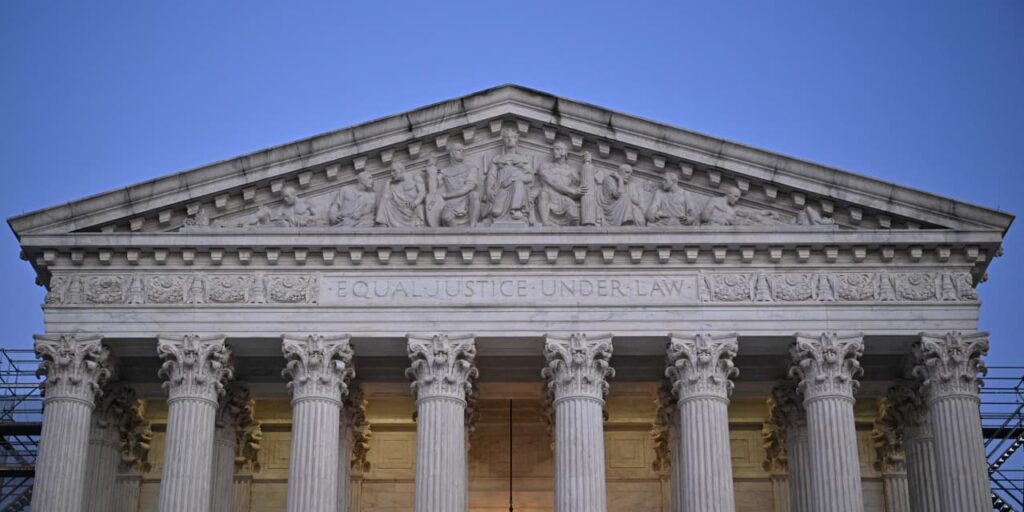George Jarkesy was fined $450,000 nine years ago, after a Securities and Exchange Commission judge found he had lied about filling hedge funds with penny stocks touted by his boiler-room boss, and had concealed the funds’ losses.
Jarkesy disputed the charges and, on Wednesday, his attorneys will ask the U.S. Supreme Court to overturn the SEC action—and with it, the ways that federal agencies have operated for 77 years. As a vehicle for industry groups unhappy with federal agency powers, the money manager’s case could crimp 30 agencies that regulate things like antitrust, energy, labor, and, of course, the stock market.
“A lot of business groups would like to challenge the SEC’s internal proceedings,” says Ronald Levin, an administrative law professor at Washington University in St. Louis. SEC powers were expanded after the 2008 financial crisis, under the Dodd-Frank Act, and the agency has had good success in cases it brings before its own administrative law judges. “It’s understandable that the business community doesn’t like that,” Levin says.
Joining Jarkesy in his Supreme Court challenge to agency judges are business groups like the Business Roundtable; libertarian organizations like the Koch family-funded Americans for Prosperity; and business celebrities like Mark Cuban and Elon Musk.
“The SEC’s use of administrative proceedings—as they are currently structured—results in unequal results for SEC defendants, an erosion of trust in public institutions, and a limitation on the availability of valuable information for the market,” said the brief filed by Musk and Cuban.
Jarkesy’s fraud case was one of hundreds the SEC brings every year before its administrative law judges. In the September fiscal year just ended, the agency brought about 230 cases in regular federal courts and over 550 administrative proceedings. Across federal agencies, nearly 2,000 internal judges handle hundreds of thousands of cases.
In Jarkesy’s case, an SEC judge ordered in 2014 that he and his business stop committing fraud, disgorge $1.3 million, and pay a $450,000 civil penalty. The agency commissioners backed that ruling. But the New Orleans-based U.S. Court of Appeals for the Fifth Circuit overturned the SEC proceeding and held that the agency’s administrative courts were unconstitutional. The SEC has appealed to the Supreme Court.
In Wednesday’s arguments, the Supreme Court will seek views on three ways that the Fifth Circuit found the SEC administrative court was unconstitutional. Washington University’s Levin is one of a number of administrative law experts who filed advisory briefs with the Supreme Court to argue that the Fifth Circuit ruling is wrong.
First, the circuit court held that only a regular federal court or jury can assess a monetary penalty. Administrative courts have done so for years, Levin notes, and sending such cases to federal district courts would aggravate the courts’ overload of cases. If the Supreme Court so held, however, Levin says the SEC could still bring cease-and-desist cases internally.
The Fifth Circuit’s next finding was that administrative agencies shouldn’t be free to choose whether to bring a case internally or in a regular court. “That theory is an order of magnitude more adventurous than the others,” says Levin, and few legal commentators have backed it.
The last theory advanced by the Fifth Circuit and by Jarkesy’s backers says that administrative law judges have unconstitutional power, because the president and agency leaders can’t easily remove them.
This tenure protection has been long debated, says Levin, because it limits the elected chief executive’s power to implement policy. That independence is why Congress gave the judges’ that protection, he notes.
On the question of the judges’ job protection, Leven thinks that Jarkesy’s backers should be careful what they wish for.
“That protection generally benefits the business community,” says the professor, “Because if the SEC is cracking down on business, you can have an administrative law judge who’s independent of the bureaucracy and not captured.”
Write to Bill Alpert at william.alpert@barrons.com
Read the full article here

